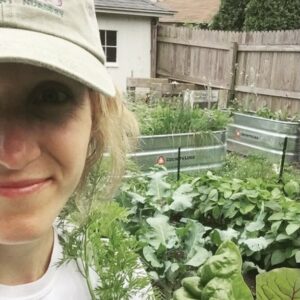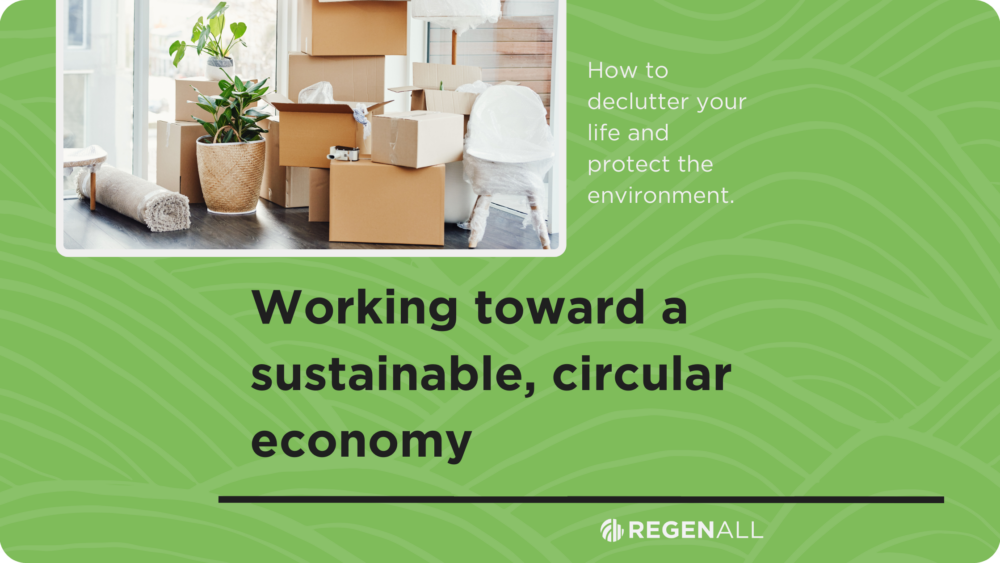There are several celebrated holidays in the United States and around the world that happen towards the end of the calendar year. Christmas, Hanukkah, Yule, Boxing Day, Kwanzaa, and New Year’s, to name a few. While these holidays remain sacred and spiritual and are an important part of culture and community to many who celebrate, these holidays often challenge our sustainable values by creating a large amount of waste: food waste, decorations, single-use plastics, wrapping paper, bows and ribbons, shopping bags, etc.
Behind agriculture and fossil fuels, landfills are the third-largest source of human-related methane emissions in the United States (US EPA). Methane, a greenhouse gas with an impact on climate change more than 25 times greater than that of carbon dioxide, is the second-most prevalent greenhouse gas emitted in the United States from human activity. Carbon dioxide, the other major ingredient in landfill gas, is the first. (National Environmental Education Foundation).
Reducing waste during the holidays
If we can reduce waste going to landfills, we can have a direct impact on climate change. According to a report for Stanford University’s Waste Reduction, Recycling, Composting, and Solid Waste Program, household waste increases by more than 25% from Thanksgiving to New Year’s, which adds an additional 1 million tons of trash per week to landfills during that time. The discarded material that ends up in landfills produces harmful greenhouse gasses like methane and carbon dioxide.
If you stress about your ecological footprint during these holidays, you are not alone. As someone with self-diagnosed eco-anxiety, or climate anxiety, I stress about the pressure for elaborate celebrations and gift-giving during these times. I find myself spending hours researching supply chains, durability, energy needs, etc. before buying something.
Unfortunately, my lack of creativity doesn’t lend well to homemade gifts. But if you have a creative skillset, I encourage you to use these holidays as an opportunity to get creative with upcycling goods into creative gifts for your loved ones. This is also a good opportunity to have honest conversations with your friends and family about gift exchange expectations. Using upcycled wrapping paper; encouraging gifts that offer experiences rather than goods; choosing durable and useful gifts; or suggesting an ‘upcycled white elephant’ gift exchange are just some ideas for how you can reduce waste with gift giving.
The Holiday season can already be exhausting enough and it is important to actually take time to rest, reflect, and set goals for the year ahead. If making drastic changes over the holiday season seems daunting or is not something you are willing to sacrifice, there are several other ways you could make incremental changes throughout the year to help reduce waste accumulated during the holidays.
Upcycling, recycling, and reusing goods
Recycling is a good place to start reducing waste! Most municipalities in Lancaster County will take glass jars and bottles, metal food and beverage cans, plastic bottles and jugs, and corrugated cardboard as part of their curbside pickup services. If you live somewhere that doesn’t offer curbside recycling pickup, you can drop it off at one of Lancaster County Solid Waste Management Authority’s (LCSWMA) locations free of charge.
We are fortunate in Lancaster County to have LCSWMA’s waste-to-energy facility where about 95% of the County’s municipal solid waste is combusted to create electricity. However, just because we have this option doesn’t mean we should continue down our wasteful paths. Operating the waste-to-energy facility still produces greenhouse gasses, not to mention the external costs of hauler transportation and the supply chain of our goods that end up going to the collection center.
Changing our mindsets and habits with how we consume and how we waste is critical for any kind of sustainable future. Recycling is good. Reusing is better. Reducing is best.
Upcycling, or reusing, is a great way to reduce waste that requires more effort and creativity. Embodied energy, or “emergy”, can be explained as the energy that has already been used to create something. For example, a used car has low emergy because it is already manufactured, whereas a new car has high emergy because it requires new resources and energy to manufacture it. In most cases, it is better to buy something that has low emergy rather than high emergy. This is one of the key principles of upcycling.
Donating your used goods is another great way to upcycle. One’s waste can be another person’s gold. There are several organizations in Lancaster County that will accept donated goods. Some of these include:
Repairing items rather than replacing them is another great way to reduce waste. This may take a little more effort and patience, which is one of the biggest challenges of our time. We are so accustomed to a fast lifestyle – fast food, fast communication, fast transportation, fast next-day deliveries, etc. Prioritizing fixing rather than replacing may require you to learn a new skill, do some research, or reach out to your community to find someone who has the resources to help you. Repair Cafes have been popping up in cities around the world to create a community around repairing items. Let’s get Lancaster on the map! Creating a community of bartering or trading goods can also be a fun and exciting way to maximize your dollar and minimize your environmental impact.
Year-round sustainable practices
Composting is another great way to help reduce waste and that will also produce a nutrient-rich byproduct that can be used in a home garden. There is never a bad time to begin composting, but the short days of winter might not lend much motivation to set up a new composting system outside.
Spring offers some benefits that might just make it the perfect time – warming weather and motivation to be outside; fresh, local produce and/or home gardening; Spring pruning and trimmings that can be added to compost; etc. You don’t need much space for a compost system, and depending on where you live there may be community composting options available to you.
Some resources to help you begin your composting journey are provided below:
- Penn State Extension’s Composting Guide for Home Gardeners
- Horn Farm Center’s Backyard Composting Workshops
- Lancaster Compost Co-Ops
As we start a new year I encourage everyone to go forward with this in mind. In a circular economy, the concept of waste is reimagined as a system where materials never become waste and nature is regenerated. Products and materials are kept in circulation through maintenance, reuse, recycling, and composting.
As we begin to reduce waste, we may also find that we can minimize consumption at the same time, decluttering our lives of environmental harm. This can afford us the opportunity to slow down, reprioritize quality over quantity, and in turn help protect and restore the world for future generations to come.

Laurel Etter Longenecker is a guest writer for RegenAll. She holds a BA degree in Anthropology and an MS degree in Resilient and Sustainable Communities with a focus on environmental studies. Laurel has experience working with refugees in Lancaster and is passionate about social rights issues, waste management, sustainable food systems, sustainable supply chains, native landscaping, etc. She enjoys going on adventures of all kinds with her husband, dog, and kids.



Comments are closed.